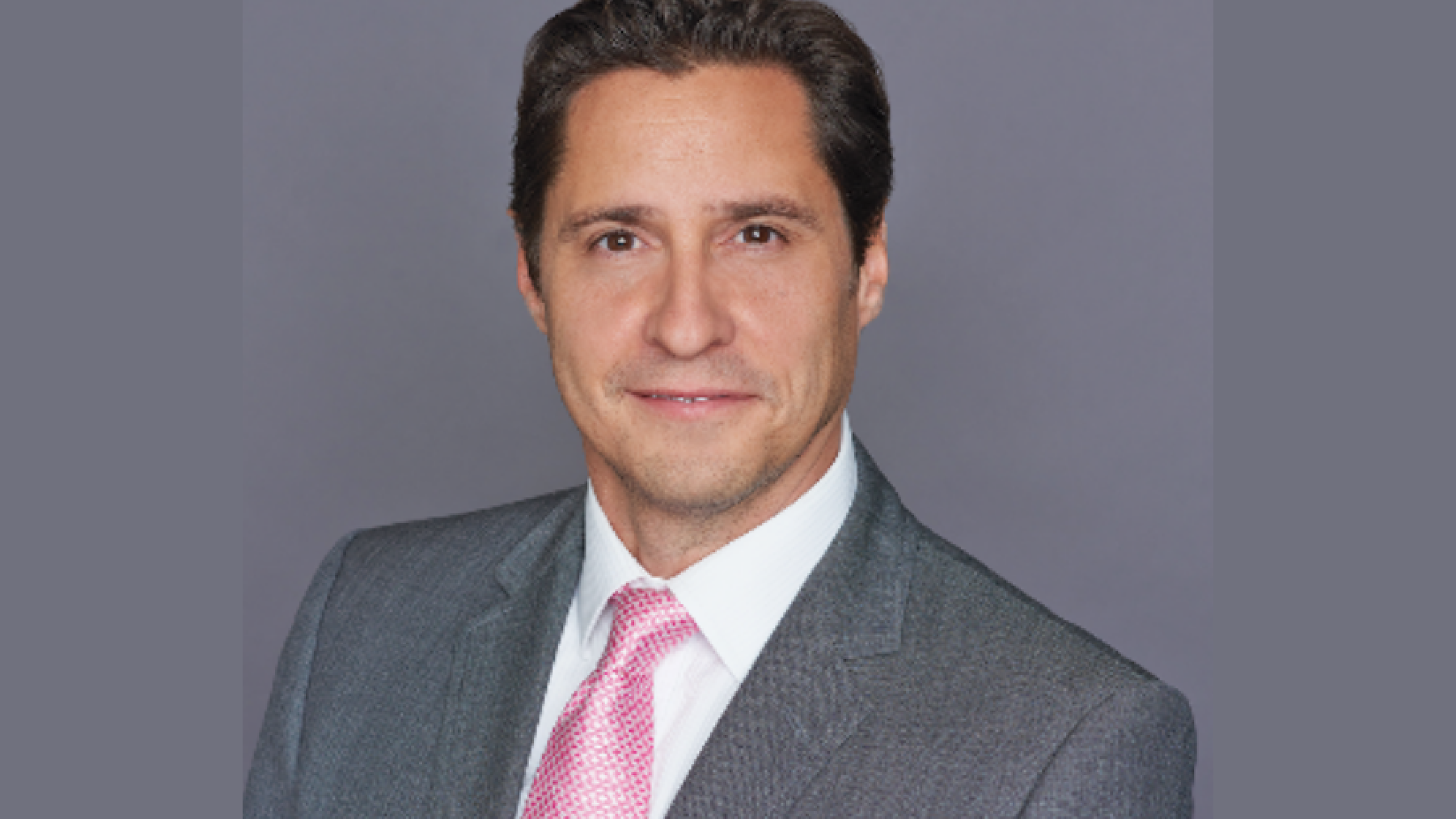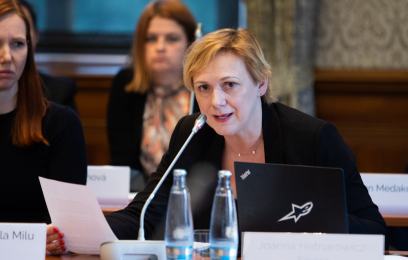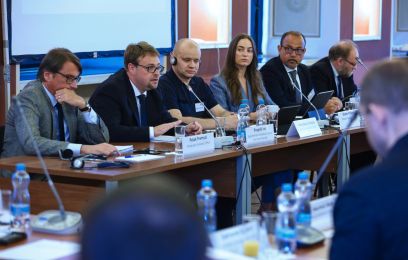Meet Jean-Michel Ferat, the Newest Member of our International Advisory Board

Longtime friend and faculty member Jean-Michel Ferat was recently appointed as the newest member of the CEELI Institute’s International Advisory Board. Mr. Ferat is currently a Senior Managing Director at Ankura in the Washington D.C. area. He first became involved with the CEELI Institute close to a decade ago, when he was recruited by long-time CEELI Institute Board Member Sue Ringler, to help develop and be part of the inaugural faculty team of the Institute’s now flagship training program – Investigating and Prosecuting Official Corruption. With twenty-five years of experience in the specialized fields of forensic accounting and fraud detection, Mr. Ferat has applied his skills in a variety of cases involving financial statement fraud, high-level corruption, terrorist financing, collusive bidding rings, money laundering, and asset misappropriation.
As we welcome Mr. Ferat to the Institute’s International Advisory Board, we were pleased to get an exclusive interview with him to discuss his career, background, and involvement with the CEELI Institute.
Throughout the years, you have worked on large and complex forensic investigations involving fraud and high-level corruption. Can you describe some of your most striking experiences?
I kicked off my career as an auditor at Pricewaterhouse in Washington, DC. In 1997, as a fluent French speaker focused on financial services clients, I was tapped to be part of a team to investigate dormant Holocaust-era bank accounts held in Switzerland. The project was led by the former Chairman of the US Federal Bank, Paul Volcker. I spent four years scouring archives throughout Switzerland in an effort reconstruct bank accounts during the period from 1933 to 1945 to determine which may have been owned by victims of Nazi persecution. While all Big 6 accounting firms at the time were involved in this historic investigation – each investigating different banks – Mr. Volcker selected our team to consolidate all the investigative findings and help establish and operationalize the Claims Resolution Tribunal to restitute funds back to victims’ heirs, a process that took well over a decade to complete. To this day, I single out this project as the most impactful one in my career.
I was lucky to be given another opportunity to work with Mr. Volker and his team in 2004 when calls came for an investigation into the United Nations Oil-for-Food Programme in Iraq. I was tapped to take the forensic accounting lead of several facets of the investigation into that $128 billion program, which, as we uncovered, was rife with kickbacks from thousands of companies around the globe back to the Saddam Hussein regime. Our job as forensic accountants was to trace the cash and sift through accounting records, audit reports, and other underlying documents to prove the schemes. This project is widely recognized as one of the largest kickback investigations in history and has been credited with jump-starting anti-corruption enforcement in jurisdictions around the globe.
What other types of cases have you been involved in over the years?
I have been fortunate in my career to work on a broad brush of matters in over 45 countries around the globe. As examples, I led a money laundering investigation in Latvia, corruption investigations in multiple West African countries, a procurement fraud review in Northern Iraq, fraud investigations from Vietnam to Indonesia, and most recently a significant investigation in the UAE of the Abraaj Group, at the time the world’s largest impact private equity manager. This last investigation led to the fall of the $14 billion Abraaj empire.
In addition to reactive investigations, I have also increasingly worked on proactive compliance and internal controls matters to help organizations identify and mitigate potential gaps in their control structures and compliance programs. This work has included multi-year corporate monitorship projects established pursuant to law enforcement and regulatory enforcement actions.
Having seen such a wide variety of bribery schemes, are you able to generalize on some aspects of these cases? How are these schemes identified from the accounting perspective?
In terms of bribery and corruption, most practitioners in this space would likely agree that the most prevalent schemes are perpetrated through third parties, outside of the organization. Understanding how and why companies utilize third parties such as consultants, resellers, distributors, and customs agents is critical to determining whether payments to those third parties are legitimate. Indeed, companies that look to pay bribes and kickbacks often look to do so via inflated payments to such third parties.
In terms of how a forensic accountant might identify red flags of fraud and corruption, our methodologies are largely rooted in data analytics. Some of our core techniques are based on the ability to acquire and analyze large amounts of corporate data – accounting data, procurement data, due diligence data, etc. – to home in on potential red flags that can be further investigated. Being able to effectively triangulate business processes and underlying data to identify anomalies is at the core of what we do as forensic accountants. So, in terms of third parties, we look to data to answer questions such as: What is the purpose for hiring this third party? Was due diligence properly executed? How much have we paid them? When and how have we paid them? Is payment commensurate with work performed? Etc.
What is next for you?
In addition to work for corporate clients, I have always been interested in working with non-profit clients that deliver impact.
I have had the pleasure to undertake substantial work for large development finance institutions including the World Bank, and the CDC Group as well as private non-profits such as The Bill and Melinda Gates Foundation, the International Rescue Committee, and the Global Fund to Fight Aids TB and Malaria. In addition to my anti-corruption investigations work for the Global Fund’s Inspector General, I was asked to join the organization’s audit committee as the independent forensic accounting expert. I completed the maximum two consecutive terms (4 years) on the audit committee in 2020. As I continue to progress in my career, I will certainly continue to find ways to give back to impactful organizations and count my ongoing work with the Institute as an anchor for me in this area.
Moving on to your work with the CEELI Institute then – can you tell us a little bit about this collaboration and how it first started?
My friend and fellow CEELI Institute supporter Sue Ringler introduced me to Homer Moyer back in 2003 when Sue and I were working together on the UN Oil-for-Food investigation. Sue mentioned that Homer was working on designing an anti-corruption course for the Institute and was looking to tap someone to help design the course’s forensic accounting and technology content.
Sue, Homer, and I spent several months designing the course, thinking through fact patterns and mocking up the evidence, including full-fledged accounting ledgers. We have tweaked the course numerous times over the years to make it better and more compelling and I have taught the course every year since its inception over 8 years ago. In addition to my own participation in teaching, I have enlisted several of my colleagues to participate in the training sessions as well.
Why do you believe it is an important program? To whom is it targeted?
I have undertaken training on forensic accounting topics through various organizations but none of them have had the participant breadth and depth of experience that the CEELI Institute participants have. Because the course is targeted at judges, investigators, and prosecutors, participants tend to be later-in-career civil servants with deep experience and keen interest in expanding their knowledge base. We are often fascinated to hear from senior judges or heads of anti-corruption commissions talk about cases they may have resolved or challenges they may be facing in their home countries. Participant interaction from senior decision-makers is really what makes this course so interesting and distinctive.
Another fascinating goal of the program is to help participants develop and forge relationships with their peers from neighboring countries. Indeed, most program sessions see delegations from four, five, or six different countries and both in-class and after-class activities encourage participant interaction and relationship building across delegations.
Do you feel enriched by your experience teaching this course over the years?
Absolutely. On more than one occasion, I have had participants approach me directly to let me know of their interest in forensic accounting and how such techniques could help push their own initiatives forward. One particular session included participants from the Tunisian anti-corruption commission (INLUCC). On the heels of the Prague training, the Tunisian delegation asked whether CEELI would offer up the services of some of our faculty for a more in-depth training in Tunis for a broader audience. As a result, I helped design and execute an in-depth training on forensic accounting which I delivered in Tunis over 2 full days. Being able to visit that beautiful city and engage directly with an extremely inquisitive group of professionals was truly a fulling experience for me.
Why join the development committee, and more recently the International Advisory Board?
I want to continue to find ways to work with impact driven organizations outside of my normal corporate client base and I count the CEELI Institute at the top of my list. I accepted to join the Institute’s development committee to leverage my firm’s growing network of corporate clients to continue to raise awareness about the importance of the Institute’s mission and to try to raise resources for the Institute to the extent possible.
I am looking forward to working with all my wonderful colleagues on the International Advisory Board to help CEELI continue to carve its path forward in the coming years and focus its resources where it can provide the most impact.
This interview took place on September 8th, 2021


